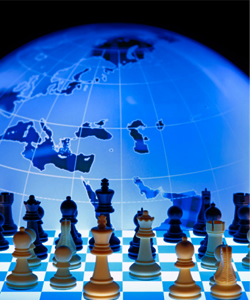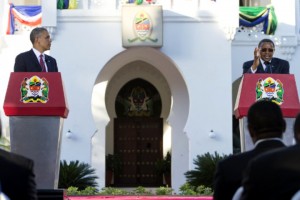One of the favorite saws of American pundits on both the left and the right is “all politics is local.” Like so much else in political life in the world now, it has become as untrue as it is trite. The truth is all politics has become global.
 A dialogue with a reader in Tanzania about the urgent necessity of psychological revolution and its manifestation in a global polity generated a central question. The reader, misconstruing my premise and upholding localism, proclaims, “the society can change and the spread of global polity can be given and identified in our societies in which we live.”
A dialogue with a reader in Tanzania about the urgent necessity of psychological revolution and its manifestation in a global polity generated a central question. The reader, misconstruing my premise and upholding localism, proclaims, “the society can change and the spread of global polity can be given and identified in our societies in which we live.”
In one sense that’s true, but only after a global polity emerges. The first question is: Can an effective global polity spread from the parts to the whole, from the nations and societies in which we live, or does it go the other way, from the whole to the parts?
There is no way to square this circle. We have to find out whether a global polity can emanate and extend from localities (however small or wide their domains), or from a perception and feeling for the whole of humanity.
My clever and well-educated Tanzanian friend states: “With different objectives displayed, we focus on different areas that can help the society we live, and sustain the environment of a particular area.” But I question this assumption and approach. Though it sounds reasonable, and few would disagree, it’s philosophically and politically unworkable.
The reason is simple. If a global polity has “different objectives that focus on different areas of a particular area,” the antiquated premise ‘all politics is local’ continues to obtain, and there can be no global polity.
Besides, the trend toward localism is allowing the politics of ‘divide and conquer’ to continue. That permits the soulless pillagers of the earth, who care neither about a given land or the earth as a whole, to carry on with the Sixth Extinction.
For example, my Tanzanian friend and I are discussing the threat to one of the most important animal species on earth—the African elephant. As China grows in wealth, many people in the PRC, ironically enough, desire elaborately carved ivory as an emblem of prestige. That in turn is fueling a huge trade in illegal tusks obtained from poaching, which is slaughtering many elephants per month.
Is the threatened extinction of African elephants a local or global issue? Many Chinese would say it is none of our business in the West what they buy in their own country, and that it is between them and African countries, under the guise and guile of sovereignty. But that is simply self-serving and unintelligent.
business in the West what they buy in their own country, and that it is between them and African countries, under the guise and guile of sovereignty. But that is simply self-serving and unintelligent.
Elephants belong to the earth and everyone on it. They are being slaughtered, driven to the brink of extinction, and are in danger of being reduced to zoo attractions. Tanzania’s President Kikwete was in London last week at a conference on this issue, which called for closing the market on the ivory trade.
But misconstruing the intent of a global polity, my Tanzanian colleague says, “I think the market must be closed first in the minds of the people. People must firstly think that animal protection is on their hands, we need to know animals and natural forests have to be protected by human beings. In doing so, we can make the natural resources sustainable.”
He is correct in saying real and lasting change is first in the hearts of men and women. But elephants are being wiped out right now, and the insight of psychological revolution cannot be used as an excuse for inaction at the political level.
Obviously, the trade in ivory should be banned, not just restricted, since there is no way to separate a regulated market from the black market under present conditions. Trading in elephant tusks is barbaric and belongs to man’s past, no matter how treasured the customs and artifacts of their death in one country, however large.
At the universal level, the Sixth Extinction, which is defined as “the elimination of a significant proportion of the world’s biota in a geographically insignificant amount of time” (for the first time the earth’s history by a sentient species), cannot be halted by political action, only by psychological revolution. If this revolution does not ignite and manifest now, man will decimate the earth, and the future will be grim indeed.
As nations become less relevant, people all over the world have lost faith in politics at the national and international levels. Yet cooperation at these levels remains indispensible. Though cities and towns are reemerging, what is the glue that will bind them, and peoples everywhere?
A non-power-holding global polity, superseding the United Nations in principle but not function, will, whenever and wherever it manifests, signify and catalyze a revolution in human consciousness that embodies a new covenant between human beings and nature, halting the Sixth Extinction by man.
A Global Polity will also spiritually and philosophically replace the sovereignty of nation-states and identification with particular groups with the sovereignty of humanity. In so doing it will infuse insight into all levels of political organization, holding governments and international institutions accountable to humanity as a whole.
Martin LeFevre

